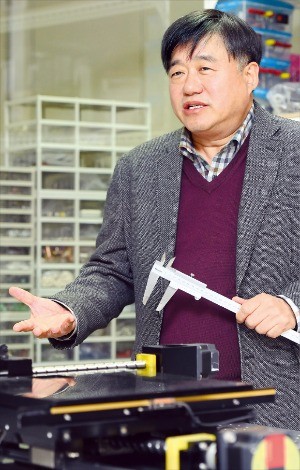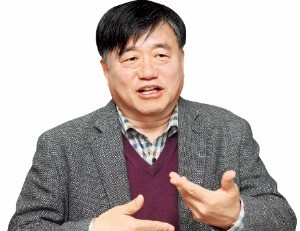Department News
[Korean Economy] 1st Generation Entrepreneur, Professor Heui Jae Pahk of Mechanical and Aerospace Engineering
"In the foreign exchange crisis, a challenge to save the nation ... giving hope for young people through industry-academia cooperation"<?xml:namespace prefix = "o" ns = "urn:schemas-microsoft-com:office:office" />
Inside Interview
[Korean Economy] 1st Generation Entrepreneur, Professor Heui Jae Pahk of Mechanical and Aerospace Engineering

Professor Heui Jae Pahk is demonstrating the display of XY motion test machine
Kang Eun Koo reporter egkang@hankyung.com
Stock prices plunged and corporate bankruptcies soared. On November 21, 1997, the Korean government officially applied for bailout money to the International Monetary Fund (IMF). Professor Park Hee-jae, a professor of mechanical and aerospace engineering who taught students at Seoul National University that year, went to the "gold-gathering movement" saying that the he would save the country.
In February 1998, Park, together with five graduate students, showed revealed the SNU Precision, a display equipment company. It was to earn dollars for export. He said, "If I were a genuinely talented engineer, I had decided to do a good job in the marketplace to replace one dollar with another and export a dollar." His challenge was not in vain. Last year, SNU Precision, which Pak Hee- jae has been in charge of CEO until January of this year, posted 47.8 billion won in exports, 83% of sales of 57.9 billion won. It was listed on the KOSDAQ market in 2005 and received a $ 70 million “Export Tower” in 2014.
Based on his experience, Professor Park took on the role of chairman of the Young Hope Foundation in May of last year and set out to solve the problem of youth employment. Park, a professor at Seoul National University, said, "Young people are clamoring for difficulties in getting a job, but small businesses cannot find anyone they want to hire." "There is an industry-academy project in which SMEs, universities and government- "We will catch two birds with one stone: improving the competitiveness of SMEs and eliminating the youth employment crisis."
Industry-academia cooperation should enhance SME competitiveness
"88% of all jobs in Korea come from SMEs. However, 83% of SMEs have not exported a single dollar. Most of them are very small and not technical. But, job creation and national competitiveness enhancement will eventually come from small and medium-sized businesses which are the backbone of the economy. And what is this base that supports the backbone? I say it is universities. "
Professor Park said that he learned this when he went to study at Manchester University in England after studying his doctorate in 1987. In order to get a doctorate there, I had to answer the questions, "What did your research contribute to the industry?" "On the weekend, I went to UK companies with the technology I studied with my supervisor. I told them; My name is, and I have this kind of technology, and I had to appeal to my company in three minutes that it could help. To do that, I need to be able to draw a big picture, not just about self-technology, but also about the difficulties in the field and how I can incorporate my skills into existing technology. "Eventually, he was transferred to a British company and got a position.”
Professor Park is shaping the industry-university cooperation model through the Youth Hope Foundation. One of them is 'Industry-Academia cooperation youth job platform business' where three local technoparks and Sun Moon University participated. Thirty students who actively engaged in industry-academia cooperation have educated and trained students along with companies, and over 120 students have succeeded in finding employment. He also introduced a "just-in-the-job" system. Professor Park said, "Young people take their lives to write one more line on their resume, but there are a lot of things that are not necessary for the company." The foundation selects excellent medium and small businesses one at a time and gives all applicants an interview opportunity."
Have a drink and fax to the Blue House
Professor Park received his doctorate and returned to Korea, where he became an assistant professor of industrial engineering at Pohang University of Science and Technology (POSTECH) in 1993 and became a professor of mechanical and aerospace engineering at Seoul National University in 1993.
“I made 10 projects per years with my university experience from the UK. I have done a lot of projects to say that I there is no business i had not done. Because of this, I had a lot of good patents. So I was confident in my business.”
But in 1998, when he tried to establish a company, he was in trouble.
“It was when I went to the Gwanak Tax Office in Seoul to register a business. The tax office staff turned away from the business address listed as '56-1 Sanglim-dong, Gwanak-gu, 301 Dong'. There were two problems. Seoul National University professors are education officer and could not work for profit pursuant to the "National Public Service Commission Regulations". It was impossible to establish a company or participate as an executive.
The second problem was the place. "Shimin-dong 56-1 301 Dong is a Seoul National University Engineering Institute. This is where the professor's lab is located. I was told that the company could not register the address because the building is the educational research facility and that it should be registered at a nearby mall outside of Seoul National University.
He called the building owner, the Department of Education. I asked if I could change my purpose. The answer was of course 'no'. He thought. 'I have to change the law. But (Seoul National University) can the president change the law? I'll talk to someone who can change the law. 'I drank two bottles of soju and wrote down four A4 pages. "First, let me establish a university capitals." "Second, I can not register a factory or register a business at a university. The reception was the Blue House, and the referendum was the Prime Minister's Regulatory Reform Committee.
The next day, the call came in from dawn. It was the president of Seoul National University.
"Professor Park, what did you send without my permission?"
"Yes, I will send it to you."
"Talk to me before you send any."
"Even if I faxed to the Blue House, it took a year and a half to change the law. TI had to keep visiting the Prime Minister, the Ministry of Education, the Ministry of Industry, the National Assembly, and so on. In the meantime, I once set up a student as the CEO and I built a corporation, but I could not do business properly and I had to do research and development (R & D) only. "
In early 2000, the Act on Special Measures for the Promotion of Venture Businesses was amended. There is a line of words that university professors and researchers can start without having to retire. It is also recognized that manufacturing is possible in laboratories and to make manufacturing ventures in universities too.
So, ESNY Precision has started full-scale business. The first product was a ball sensor that measures machine tool accuracy and he first export came soon. Our opponent is the Swedish automobile parts company “Shamertek”. About $ 15,000 of the export money was deposited at the SNU branch of the NACF. Professor Park said, "The one-dollar bills withdrawn from the bank are my treasure No. 1.”

You have to take off the rank and fight.
Professor Park frequently said, "A great game." In other words, it is a "challenging spirit". He said he did not regulate the start-up in college because he only regulated it. "When I'm in college, I treat myself as a professor. The moment I go to market, I am just a vendor. I have to take off the rank and think that I'm going to win the championship with my skills. "
The ball sensor market was too small. SNU Precision was a deficit. So, until 2001, we had to change to LCD (liquid crystal display) equipment marketer. Professor Park and his students studied day and night, and in 2002 launched the world's first non-contact three-dimensional nano geometry measuring instrument (PSIS). The problem was how to penetrate overseas markets. Developing good equipment was expected to be sold soon, but in reality, was not.
Professor Park decided to exhibit the equipment at an LCD exhibition in Tokyo, Japan. At that time, Japan was the world's No. 1 display manufacturing powerhouse. However, the weight of the equipment exceeded 100 kg.
“I put it on an airplane and a round trip of 2 million yen (about 20 million won at the time) came out. He said, "When I started the business, I got 30 million won, and I borrowed 20 million won from the company, and the company's capital was 50 million won," he said. "It cost 10 million won for product development and I could not spend 20 million won for transportation."
It was a trick. The equipment was disassembled and Professor Park and three graduate student staffs decided to take it apart. For three or four weeks, we had to stay in Japan and I did not pack much clothes and underwear because I did not exceed the weight limit.
The equipment was well received at the exhibition and professor Park did not want to go back wrapping up heavy equipment.
“I thought I should sell it somehow. Then, a company was interested, but the practitioner must get approval from the director. I waited for a few days and met the manager. Eventually, I met the vice president and got a conditional payment. Since then, I've sent and received more than 600 e-mails, and have made more than 30 meetings. But once I got recognized, I got a word of mouth. Japanese companies such as; Sony, Sharp, Hitachi, and Matsushita used our equipment. "
SNU Precision has also entered the Taiwanese and Chinese markets and expanded its range of products with OLED (Organic Light Emitting Diode) equipment. It was 'trust' that Professor Park managed the company. When the earthquake struck in 2011 and the Japanese display companies were caught up in the event, our engineers were without any hesitation to repair the equipment. When the radioactive fear was emitting, instead of our young staff members, the senior staffs went instead.
Twenty years have passed since the financial crisis. Would the professors' starting environment be better than that? Professor Park said, "Although it is better than the old days, there is still an atmosphere that is devoted to papers." The university evaluates the professors with the achievements of the thesis, and the government's R & D support project ends with the thesis. He was the head of the R & D Strategy Planning Department of the Ministry of Commerce, Industry and Energy for four years from 2013, and the most important thing was to change the R & D evaluation criteria of the Ministry of Industry from the number of papers to sales and employment.
"80% of the professors in science and engineering are at universities and government-funded research institutes. If they can do research that is not really a thesis, but a practical project, can Korea make another leap? "
The lack of entrepreneurship among professors is considered to be the cause, but the environment that hinders the establishment of professors is also a problem. Seoul National University limits the business hours of professors to one-fifth of the time of research and education activities. Yonsei University and Ewha Womans University have a rule that they can start re-start after three years.
Large hospitals with world-class technologies are also closed to medical technology companies. This is because of the regulations preventing the non-profit medical foundation from commercializing medical technology. Professors are able to set up companies only with personal qualifications, and there is little business start up.
Lim Geun Ho reporter eigen@hankyung.com
Check entire article http://news.hankyung.com/article/2017120846821

